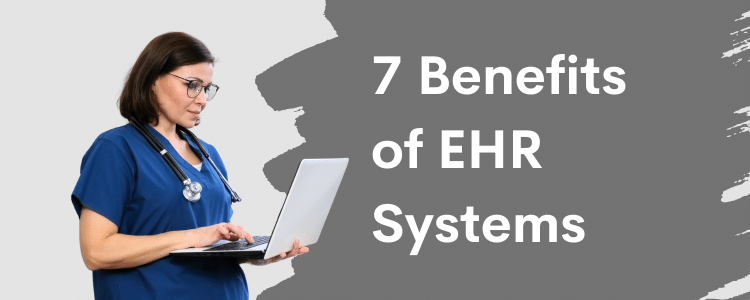According to the latest numbers, nearly four in five office-based physicians and almost all non-federal acute care hospitals (96%) have adopted some type of electronic health record system (EHR).
Are you considering implementing an EHR solution at your medical practice? Automating and streamlining your approach to health records is a smart move. Not only can it save your staff members time and energy, but it can make your operations more efficient and secure.
Today, we’re sharing a few of the top benefits of EHR software, so you can start thinking about digital transformation.
7 Benefits of EHR Software
1. Improved Quality of Care
When patients are at the point of requiring care, medical professionals need accurate and complete information on demand. If they have to spend a significant amount of time tracking down patient records and correcting various fields, this can impact the overall outcome of care.
Not only does an EHR system help simplify access to patient records, but it can make diagnoses easier to provide. On the provider’s side, physicians can access the EHR to learn more about the patient and the issues they’re experiencing. With just a few clicks, they can access in-depth, customized health analytics that allow them to:
- Recognize patterns
- Predict diagnoses
- Recommend treatment options
These analytics can help physicians achieve more accurate results the first time, mitigating the need for trial-and-error approaches that can make symptoms worse.
EHR Selection Case Study
A government entity selected an EHR system that integrated a variety of its functional areas, including Clinic Operations, Pharmacy Operations, Health Plan Administration, and more.
2. Easier Patient Access
An EHR doesn’t just benefit the facility that implements it. It also helps the patients who use it. These systems give patients access to secure online portals, accessible to authorized users at any time.
Once in the portal, patients have access to a variety of records and files, from visit summaries and test reports to prescription information and treatment recommendations. They can also use the portal to communicate with their provider via chat, messaging, or video call.
In addition, most systems allow patients to schedule, adjust, or cancel appointments directly online.
3. More Efficient Progress Tracking
Without enterprise software like an EHR system, providers must call or email patients to find out how they’re progressing after treatment. This can result in miscommunication, especially if one party has a difficult time reaching the other.
With electronic patient records, both patients and providers can enter progress updates on the portal. Then, each party can view the updates in real time. This allows providers to make quick suggestions or treatment changes according to what’s posted.
4. More Accurate Patient Records
Any time an organization is working with inaccurate records, the outcome can be detrimental. In healthcare, it can be devastating.
It’s critical that providers and their team members have a single source of truth for all patient data. This reference must be correct, up-to-date, and 100% complete.
This feat can be hard to accomplish on legacy systems, especially if they aren’t integrated with other enterprise systems throughout the organization. (Many of our software expert witness engagements involve some type of software integration issue.)
With full EHR integration, employees can make a change at one location, and it’s updated across the entire organization. This also mitigates issues related to manual errors, including ones associated with handwriting and legibility.
5. More Secure Patient Data
Patient healthcare data must not only be complete. It should also be secure.
Moving records from manual, file-based systems to a digital solution greatly reduces the likelihood that information will be:
- Stolen
- Shared with unauthorized individuals
- Misplaced
- Damaged
- Altered
Most EHRs operate on two-factor authentication, which enhances security and helps verify user identity.
6. Ensures Continuity of Care
If you’ve ever tried to switch medical providers, you know that the process isn’t always simple. This is especially the case if one or all of the providers are still working with paper-based records.
As paperwork is changing hands, there’s the chance that a file could be lost or misplaced. This means that the new physician could be referencing old or inaccurate data when assessing a patient and making a diagnosis.
EHR software provides both transparency and continuity. This way, if a patient switches providers or decides to see a new physician, they will have an up-to-date view of their complete medical history and won’t have to start from scratch.
7. Streamlined Coding and Billing
When it comes to the coding and billing process, even the smallest manual error can be timely and expensive to fix. When this happens, it becomes more difficult for the company to manage its income and ensure payment.
With EHR software, much of this work takes place automatically. This streamlines the process and helps ensure that billing is always accurate.
When claims contain fewer mistakes, they can be processed more quickly, which puts revenue back into the healthcare organization.
In turn, the fewer lost, delayed, or inaccurate claims that a company processes, the faster reimbursements can arrive.
Another benefit of automated coding and billing is reliable record keeping. If a provider ever needs to dispute or provide more evidence to support a claim, they can simply reference the EHR system.
Next Steps: Go Digital ASAP
Is your healthcare organization considering electronic health records? If so, now is the time to act. As more companies like yours make the switch, those that don’t innovate could get left behind.
There are many more operational and financial benefits of EHR. To learn how it could transform your organization, contact our enterprise software consultants below.














